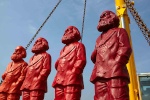The Future of Libya?
+4
flatowkorps
Celtiberian
TheocWulf
Admin
8 posters
:: General :: International Affairs
Page 1 of 1
 The Future of Libya?
The Future of Libya?

There are many conflicting accounts of the interests involved in supporting the rebels' cause. There is clearly a significant amount of ideological heterogeneity that characterizes this struggle. As such, the outcomes of any subsequent elections should be interesting.
What do you think the future has in store for a Libya 'liberated' from the Gadhafi regime? What level of dubious Western involvement do you anticipate?
Last edited by Admin on Fri Aug 26, 2011 12:57 pm; edited 1 time in total
 Re: The Future of Libya?
Re: The Future of Libya?
The mans involvment will be behind the curtian stuff and makeing sure the mainly intact Libyan army and police keep western investments safe while the rebel government decends into a circuis of etnic, tribal,politcal and religouse arguments while the well armed and organised AQ and jihadist elements of the rebal forces begin a terrorist/insurgancy campaign against the new government.Think Wiemar Germany on jihadi steroids

TheocWulf- _________________________

- Tendency : English Folk Distributism
Posts : 461
Reputation : 113
Join date : 2011-08-18
Location : England
 Re: The Future of Libya?
Re: The Future of Libya?
The downfall of the 'Great Socialist People's Libyan Arab Jamahiriya' was inevitable. Col. Gaddafi always represented a thorn in the side of the West, even after they were able to intimidate- and essentially force him- into numerous concessions following the invasion of Iraq. However, we should avoid viewing the current Civil War as solely the product of NATO meddling in Libyan affairs—as certain leftists, such as the CPGB-ML and Luc Michel (the National Bolshevik), contend.
Despite paying lip service to democracy in his Green Book, Gaddafi's regime was despotic. His Third Positionist form of socialism also left much to be desired in theory, and in practice it wasn't any better. Of course, Libya has drifted more toward neoliberalism in recent years, as Peter Boyle discusses in the following article:
Unfortunately, I don't think the rebel leadership of the Libyan revolt will "heed the lessons of their own history," as many of them are undoubtedly opportunistic reactionaries. Take Mohammed Busidra, who assured Canada's Globe and Mail that he would "remain favorable toward the West and its governments and oil companies." Gaddafi's maintenance of nationalized oil—among the last vestiges of his socialism—has obviously outraged the West for decades.

The true test to tell whether or not the new Libyan regime is merely another puppet government of the West will be in whether they privatize Libya's oil industry.
Finally, I'll just add that I think Muammar Gaddafi, while always somewhat eccentric, has really lost his mind in recent decades.
Before his apparent collapse into near insanity:

...and after:

Despite paying lip service to democracy in his Green Book, Gaddafi's regime was despotic. His Third Positionist form of socialism also left much to be desired in theory, and in practice it wasn't any better. Of course, Libya has drifted more toward neoliberalism in recent years, as Peter Boyle discusses in the following article:
Gaddafi's Libya: From Nationalism to Neoliberalism
In 1987, I visited Libya as a journalist for the left-wing newspaper Direct Action. I visited Gaddafi's bombed-out home—attacked by the United States one year earlier.
In the 1980s, the Gaddafi regime came under attack from the US government because it took an anti-imperialist line and gave financial and material aid to many national liberation movements at the time.
There were also some weird right-wing sects seeking, and sometimes obtaining, Libyan largesse. The Gaddafi regime also meddled disastrously and sometimes bloodily in factional disputes within the Palestinian liberation movement.
The Gaddafi regime said it provided its citizens with free education and health, though quality and access was uneven. Tellingly, Libyans who could afford it preferred to go to neighbouring Tunisia or Europe. It provided its workers with some welfare, but did not allow unions. Nor did it treat its significant number of "guest" workers equally or fairly, some of whom were placed in closed labour camps.
A bizarre personality cult around Gaddafi was obvious. There was a pretence at popular democracy through a system of "people's congresses", but these seemed to have only a nominal existence.
Gaddafi came to power in the 1969 revolution led by young military officers that overthrew pro-US King Idris.
Left commentator Tariq Ali dismissed the Gaddafi-led 1969 revolution in a February 22 British Guardian article as "all for show, like his ghosted science-fiction short stories".
But there was a political revolution in 1969 that did result in the nationalisation of Libya's oil industry. The broader redistribution of oil wealth contrasted sharply with practices in countries such as Saudi Arabia. This was a nationalist revolution, similar to that led by Gamal Nasser in Egypt, whose government also called itself "socialist".
The US and other imperialist governments saw this as an attack on their presumed right to exploit Libya's oil resources. David Mack, a former US diplomat and state department official, explained how the US reacted to the 1969 revolution in the January 2011 Foreign Service Journal: "By 1969, the US and British air bases in Libya were of declining strategic importance, but Tripoli had become a producer of energy vital to the economies of our West European allies and profitable for American companies.
"While the US still enjoyed a cozy relationship with an aging monarch and his sclerotic political system, Libyan popular attitudes were not isolated from the rest of the Arab world … This set the stage for the Libyan Revolution of September 1, 1969.
"Eventually, US policy adapted to these new realities … Much later, during the Reagan administration, the US supported and provided some military training to Libyan emigre opponents of the Gaddafi regime. They proved unreliable."
Former US secretary of state Henry Kissinger said in his memoirs that the Nixon government had prepared a covert program to assassinate Gaddafi and other leaders of the 1969 revolution. However, this was abandoned because big oil companies such as Exxon and Mobil preferred to cut a deal with the regime—albeit on tougher terms.
The Gaddafi regime has come a long way since then. It has increasingly betrayed the promises and gains of the 1969 revolution.
The International Monetary Fund said in a February 15 report: "An ambitious program to privatise banks and develop the nascent financial sector is underway. Banks have been partially privatized, interest rates decontrolled, and competition encouraged.
"Ongoing efforts to restructure and modernize the Central Bank of Libya are under way with assistance from the Fund…"
The IMF noted positively the "passing in early 2010 of a number of far-reaching laws bodes well for fostering private sector development and attracting foreign direct investment".
The report said: "Recent developments in neighboring Egypt and Tunisia have had limited economic impact on Libya so far."
The IMF will have to eat that prediction. The stifling political repression (fiercest in Libya's impoverished east), as well as the corruption, nepotism and flamboyant lifestyles enjoyed overseas by Gaddafi’s children, have proved too much. And the stirring example of the youth of Tunisia, Egypt, Bahrain, Algeria, Yemen, Jordan, Sudan and Djibouti provided the spark.
What has led to this new Libyan revolution is the degeneration of the regime born of the 1969 revolution into "crony capitalism". The popular character of the new revolution is undeniable, but it is far from clear what sort of regime will emerge out of it.
The same greedy and powerful Western interests that first attacked and then propped up the Gaddafi regime are preparing for a change of tack—including considering direct military intervention. As the 19th Century British Prime Minister Lord Palmerston famously observed: "We have no eternal allies, and we have no perpetual enemies. Our interests are eternal and perpetual…"
Hopefully the makers of the new Libyan revolution will heed the lessons of their own history.
Unfortunately, I don't think the rebel leadership of the Libyan revolt will "heed the lessons of their own history," as many of them are undoubtedly opportunistic reactionaries. Take Mohammed Busidra, who assured Canada's Globe and Mail that he would "remain favorable toward the West and its governments and oil companies." Gaddafi's maintenance of nationalized oil—among the last vestiges of his socialism—has obviously outraged the West for decades.

The true test to tell whether or not the new Libyan regime is merely another puppet government of the West will be in whether they privatize Libya's oil industry.
Finally, I'll just add that I think Muammar Gaddafi, while always somewhat eccentric, has really lost his mind in recent decades.
Before his apparent collapse into near insanity:

...and after:

 Re: The Future of Libya?
Re: The Future of Libya?
Rich men wants more oil. The future of Libya is Afganistan&Iraq v2.0, they are just making better PR in TV.

flatowkorps- ___________________

- Tendency : Strasserism
Posts : 19
Reputation : 6
Join date : 2011-08-07
Age : 30
Location : Eastern Europe
 Re: The Future of Libya?
Re: The Future of Libya?
While I do not think Gadhafi's Libya is the best role model, I certainly do think it is better than anything NATO and their terrorist buddies will set up. While many here would not call him a socialist he did share a lot of the wealth from Libya's oil industry with the people.
My newest Youtube vid.
My newest Youtube vid.

Pantheon Rising- _________________________

- Tendency : Marx minus Feurbach
Posts : 541
Reputation : 223
Join date : 2011-07-10
Location : PA
 Re: The Future of Libya?
Re: The Future of Libya?
I fully supported Gaddafi and number him among one of the greatest leaders of the modern era.
As for their future, i'm hoping that some sort of green resistance will surface, perhaps with support from the newly independent Azawad and install a suitable leader. My vote goes to his daughter personally, but i imagine others would do.
As for their future, i'm hoping that some sort of green resistance will surface, perhaps with support from the newly independent Azawad and install a suitable leader. My vote goes to his daughter personally, but i imagine others would do.
Xachiavelli- ___________________________

- Tendency : Leninist
Posts : 5
Reputation : 2
Join date : 2012-09-26
Age : 30
Location : England
 Re: The Future of Libya?
Re: The Future of Libya?
Xachiavelli wrote:I fully supported Gaddafi and number him among one of the greatest leaders of the modern era.
As for their future, i'm hoping that some sort of green resistance will surface, perhaps with support from the newly independent Azawad and install a suitable leader. My vote goes to his daughter personally, but i imagine others would do.
I wouldn't call him "one of the greatest leaders of the modern era", and the level to which he could be called socialist is indeed very questionable. I will, however, say that I'm wary of what may replace him. I don't yet trust these rebel's sincerity in establishing a democratic mode of conduct.

Crimson Phoenix- ___________________________

- Tendency : Market Syndicalism
Posts : 26
Reputation : 10
Join date : 2012-08-30
Age : 34
 Re: The Future of Libya?
Re: The Future of Libya?
Yeah, got this feeling it's already turned into a theocratic fundamentalist state somewhat akin to the Shiite-controlled Iraqi government (versus as it were under secular Ba'athist control). The secularish strong men are being knocked off one after another it would seem. Egypt too. Syria soon. We will see.

capitalism_collapse- _________________________

- Tendency : Red
Posts : 151
Reputation : 70
Join date : 2012-08-10
Location : Pangea
 Similar topics
Similar topics» 10 U.S. legislators sue Obama Libya intervention
» Libya: Gaddafi 'Used Rape As Weapon Of War'
» Intresting thoughts on the situation in Libya
» Pro-Gaddafi forces strike back, 'Libya out of control'
» The future of America
» Libya: Gaddafi 'Used Rape As Weapon Of War'
» Intresting thoughts on the situation in Libya
» Pro-Gaddafi forces strike back, 'Libya out of control'
» The future of America
:: General :: International Affairs
Page 1 of 1
Permissions in this forum:
You cannot reply to topics in this forum






